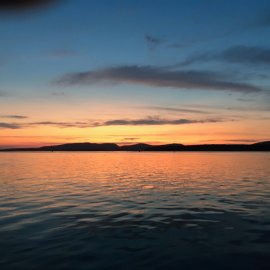Atlantic Mirror, Pacific Reflection
-
English
-
ListenPause
intro music
Welcome to World Ocean Radio...
I’m Peter Neill, Director of the World Ocean Observatory.
Maps of the world fascinate me – as global projection and perspective that provide context, even humility, as we consider both our past and our future. A change in the visualization of the world can change the course of history. And we can overlay that history on the perspective chosen and from conclusions drawn, and project a new history going forward. It is as simple as realizing the relationship in area, volume, and arrangement of land in the midst of a planetary sea, our “blue marble,” our water planet where the essence of ocean and ocean systems determines who, what, where, when, and how we are.
The maps indicate the symmetry of division into halves: north and south, east and west, Atlantic and Pacific -- geo-social spaces where we execute the collective action that, presumptively, dare to engage with the natural systems above, on, and below the surface of the sea.
Our perspective, for better or worse, assumes the consummate value, even ascendency of the West, the Atlantic world that acts as a “mirror” of our history, our peace and war, our success and failure over time. The East, always there, however, becomes a “reflection” of that history, as if it serves as a lesser place or system, descendant if you will, of our egoistic record. It is, of course, co-equal and conjoined in a unified system of action and interaction meteorologically, geographically, ecologically, socially, and politically. It is parallel and connected, and often, with our hubris, we ignore that truth.
The circumstance contained in today’s oceanic world is ample proof. We are connected east to west, west to east, by weather systems, trade patterns, communications technology, migrating species, social interaction, and geo-political acts such as treaties, financial exchange, and posturing acts of offense and defense that threaten, indeed disrupt, the normative systems that support at least the idea of peace and community. We can see it in strategic events today in the Black Sea, the Red Sea, the straits of Taiwan and Mindanao, the Arctic and Antarctic, and many places elsewhere. These are just the events top-of-the news today; there are many others, mostly invisible, but equally fearsome and disruptive, in which below the surface we have also lent a hand.
I speak often the rubric: the sea connects all things, but it is important to remember how that same place can be a locus of disconnection, of pain and loss, hostility and destruction of systems, lives, and hopes for the future. We are fighting water wars, over control and access to the natural system that is the most universally necessary asset on earth. It may be local – industrial dumping in a river with downstream effect. It may be regional – plastic waste polluting a watershed from mountain-top to coastal plain. It may be national – emissions from energy generation and consumption patterns distributing acid into the atmosphere and downwind. It may be international – the insatiable harvest of food and health resources across and beyond national jurisdiction. The synergy between Atlantic and Pacific is threatened, and we have yet to find an effective path through “looking glass” between them that will restore the symbiosis and service such ocean systems can provide.
Step back, and spread out the global maps to examine again. Study the historical projections and perspectives. Overlay the visualization of modern conflict. Understand how the support systems therein have been challenged and preempted. Lay down patterns of healing, invention, and alternative scenarios. Apply a doctrine of selflessness and co-equality. Imagine yourself in that better unified place. Enumerate what it would take for you, your family, your neighbors, your community, your nation, and all the structures we have created to address identified problems. Apply your conclusion to your actions at every level. Bring this new perspective and projection to your engagement with the present and future. Engage your children. Embrace your neighbor. Understand the legitimate needs of the refugees and seekers among us. North/South, West/East, Atlantic/Pacific, Mirror/Reflection: it is time we follow Alice, climbing through the “looking glass” to see from, in, and beyond, where things are reversed, including convention and logic, and we are welcomed into a new reality of our own devising. We cannot be victims. We have the capacity to react and act, imagine and institute change. There is. Nothing to be afraid of. No one is immune. Everyone is a victim if we fail.
We will discuss these issues, and more, in future editions of World Ocean Radio.
outro music
This week on World Ocean Radio we are correlating relationships and connections east to west, Pacific to Atlantic, from weather to communications, from financial exchange to treaties, from defensive and offensive events in the world toward connections and perspectives, new imaginings and change for a new, sustainable future. The sea connects all things.
About World Ocean Radio
World Ocean Radio is a weekly series of five-minute audio essays available for syndicated use at no cost by college and community radio stations worldwide. Peter Neill, Director of the World Ocean Observatory and host of World Ocean Radio, provides coverage of a broad spectrum of ocean issues from science and education to advocacy and exemplary projects.
- Login to post comments



